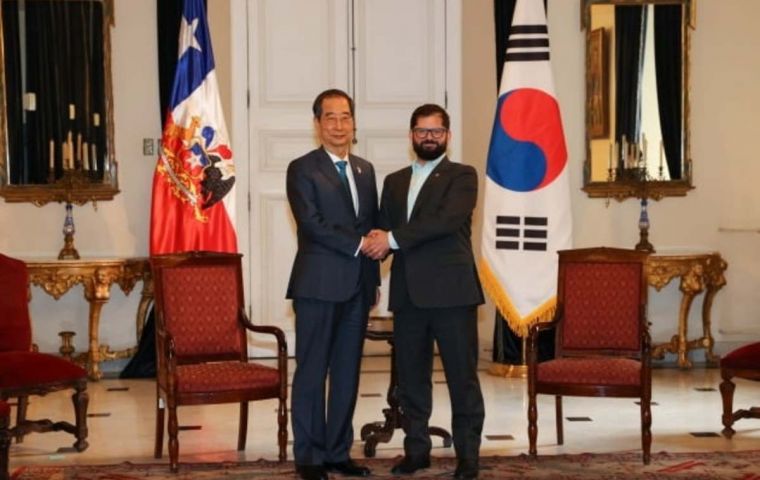MercoPress. South Atlantic News Agency
Chile and visiting South Korean PM agree to update trade deal and a strategic minerals MOU
 South Korean Prime Minister Han Duck-soo (L) and Chilean President Gabriel Boric in Santiago before the talks on October 11, 2022
South Korean Prime Minister Han Duck-soo (L) and Chilean President Gabriel Boric in Santiago before the talks on October 11, 2022 Chilean president Gabriel Boric and South Korean Prime Minister Han Duck-soo agreed on Tuesday in Santiago to resume negotiations this year to upgrade a bilateral free trade agreement that went into effect in 2004.
They also agreed to elevate bilateral relations to a strategic partnership as the two nations mark the 60th anniversary of establishing diplomatic ties this year. South Korean Prime Minister Ham Duck-soo in on a three countries visit of South America.
Chile was the first leg of Han's three-nation trip that will also take him to Uruguay, where he arrives this Wednesday and later to Argentina.
Chile was South Korea's first free trade deal partner, and the deal has served as a springboard for South Korean firms seeking to tap the Central and South American markets and invest in manufacturing and mining..
After the talks, Han told reporters that such agreements could serve as “an opportunity to solidify Chile as a partner in South America.”
Han and Boric exchanged opinions to deepen cooperation in the fields of trade, investment, mineral resources and climate change.
Han also asked Boric for support for South Korea's bid to host the 2030 World Expo in the southeastern port city of Busan.
On the sidelines of the talks, the Korea Mine Rehabilitation and Mineral Resources Corp. signed a memorandum of understanding (MOU) with its Chilean counterpart on the supply of mineral resources.
The MOU is part of South Korea's efforts to diversify supply chains of key raw materials used in batteries, in a move to cope with the U.S. Inflation Reduction Act.
The U.S. law gives tax credits only to electric vehicles assembled in North America, preventing South Korean carmakers from receiving such credits.
Under the U.S. law, however, South Korean carmakers could receive the subsidies if they use raw materials produced in the United States or Chile, which signed a free trade deal with Washington, for batteries in electric cars.
Han told reporters that the MOU would “significantly help” South Korea cope with the U.S. law. “I think we should invest more in Chile for raw materials, such as minerals, which are key to economic security,” Han said.
Later in the day, Han delivered a keynote speech at a meeting of the UN Economic Commission for Latin America and the Caribbean.
South Korea, Central America and Latin America “will be able to strengthen cooperation based on mutual trust as effective partners contributing to the stability of the global supply chain,” Han underlined in the speech.
In particular, South Korea offered Central and Latin American cooperation in the fields of hydrogen economy, farm renovation and digital innovation.




Top Comments
Disclaimer & comment rulesCommenting for this story is now closed.
If you have a Facebook account, become a fan and comment on our Facebook Page!